Philosophy Essay: Socratic Method & Learning Differences in Children
VerifiedAdded on 2023/06/03
|7
|1492
|240
Essay
AI Summary
This essay delves into two critical questions: the applicability of the Socratic method in contemporary schools and the impact of socioeconomic status on a child's learning potential. It argues that the Socratic method, with its emphasis on inquiry and critical thinking, is essential for cultivating well-rounded individuals capable of independent thought, contrasting this with current educational systems that prioritize rote memorization and standardized testing. The essay also addresses the research highlighting the correlation between a child's environment and cognitive development, particularly the impact of poverty on brain development and academic performance. While acknowledging the challenges faced by children from disadvantaged backgrounds, the essay cautions against stigmatization and emphasizes the importance of striving for achievement regardless of socioeconomic circumstances. The essay concludes by advocating for educational approaches that foster critical thinking and address the systemic inequalities that hinder the learning potential of children from impoverished backgrounds. Desklib provides access to similar essays and resources for students.
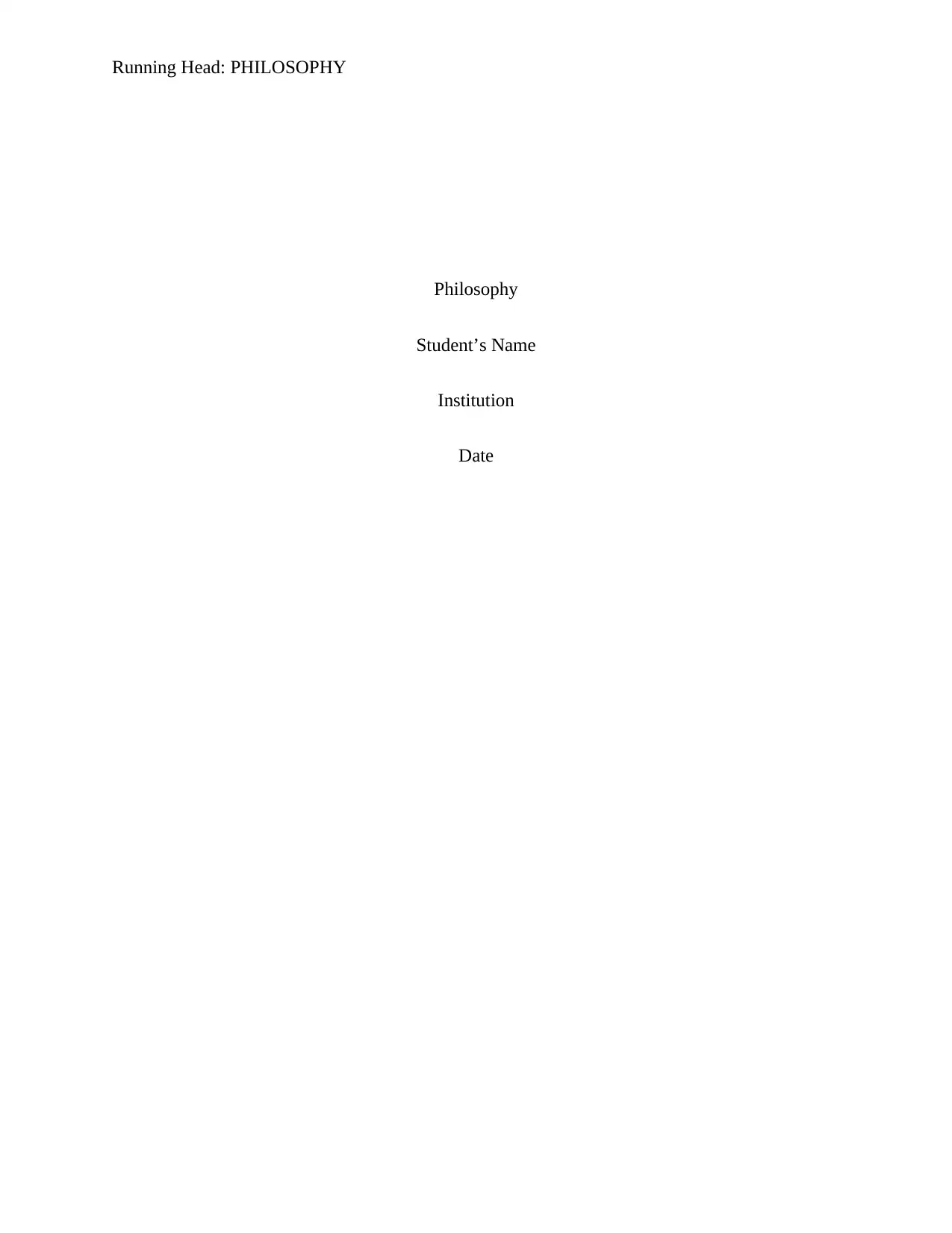
Running Head: PHILOSOPHY
Philosophy
Student’s Name
Institution
Date
Philosophy
Student’s Name
Institution
Date
Paraphrase This Document
Need a fresh take? Get an instant paraphrase of this document with our AI Paraphraser
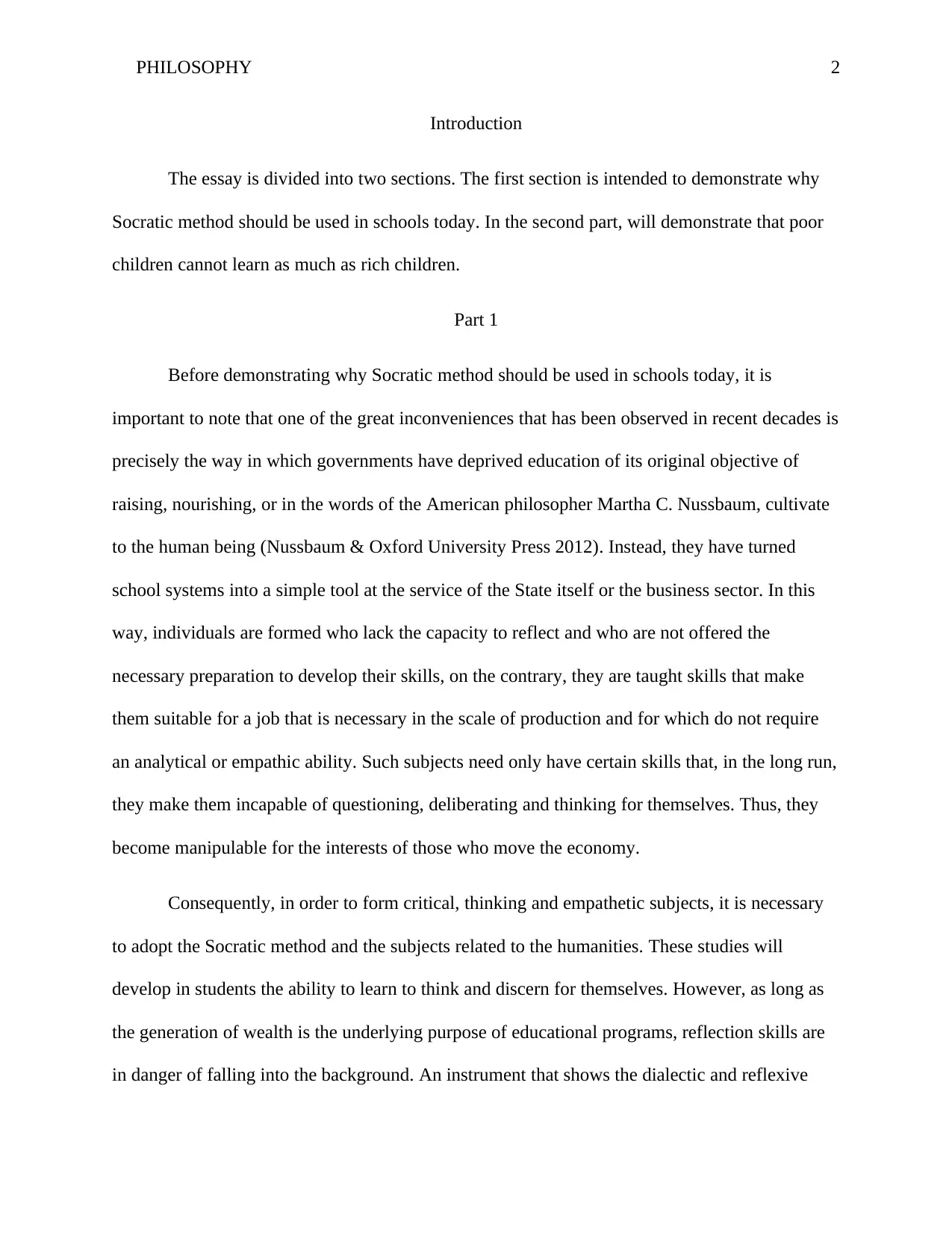
PHILOSOPHY 2
Introduction
The essay is divided into two sections. The first section is intended to demonstrate why
Socratic method should be used in schools today. In the second part, will demonstrate that poor
children cannot learn as much as rich children.
Part 1
Before demonstrating why Socratic method should be used in schools today, it is
important to note that one of the great inconveniences that has been observed in recent decades is
precisely the way in which governments have deprived education of its original objective of
raising, nourishing, or in the words of the American philosopher Martha C. Nussbaum, cultivate
to the human being (Nussbaum & Oxford University Press 2012). Instead, they have turned
school systems into a simple tool at the service of the State itself or the business sector. In this
way, individuals are formed who lack the capacity to reflect and who are not offered the
necessary preparation to develop their skills, on the contrary, they are taught skills that make
them suitable for a job that is necessary in the scale of production and for which do not require
an analytical or empathic ability. Such subjects need only have certain skills that, in the long run,
they make them incapable of questioning, deliberating and thinking for themselves. Thus, they
become manipulable for the interests of those who move the economy.
Consequently, in order to form critical, thinking and empathetic subjects, it is necessary
to adopt the Socratic method and the subjects related to the humanities. These studies will
develop in students the ability to learn to think and discern for themselves. However, as long as
the generation of wealth is the underlying purpose of educational programs, reflection skills are
in danger of falling into the background. An instrument that shows the dialectic and reflexive
Introduction
The essay is divided into two sections. The first section is intended to demonstrate why
Socratic method should be used in schools today. In the second part, will demonstrate that poor
children cannot learn as much as rich children.
Part 1
Before demonstrating why Socratic method should be used in schools today, it is
important to note that one of the great inconveniences that has been observed in recent decades is
precisely the way in which governments have deprived education of its original objective of
raising, nourishing, or in the words of the American philosopher Martha C. Nussbaum, cultivate
to the human being (Nussbaum & Oxford University Press 2012). Instead, they have turned
school systems into a simple tool at the service of the State itself or the business sector. In this
way, individuals are formed who lack the capacity to reflect and who are not offered the
necessary preparation to develop their skills, on the contrary, they are taught skills that make
them suitable for a job that is necessary in the scale of production and for which do not require
an analytical or empathic ability. Such subjects need only have certain skills that, in the long run,
they make them incapable of questioning, deliberating and thinking for themselves. Thus, they
become manipulable for the interests of those who move the economy.
Consequently, in order to form critical, thinking and empathetic subjects, it is necessary
to adopt the Socratic method and the subjects related to the humanities. These studies will
develop in students the ability to learn to think and discern for themselves. However, as long as
the generation of wealth is the underlying purpose of educational programs, reflection skills are
in danger of falling into the background. An instrument that shows the dialectic and reflexive
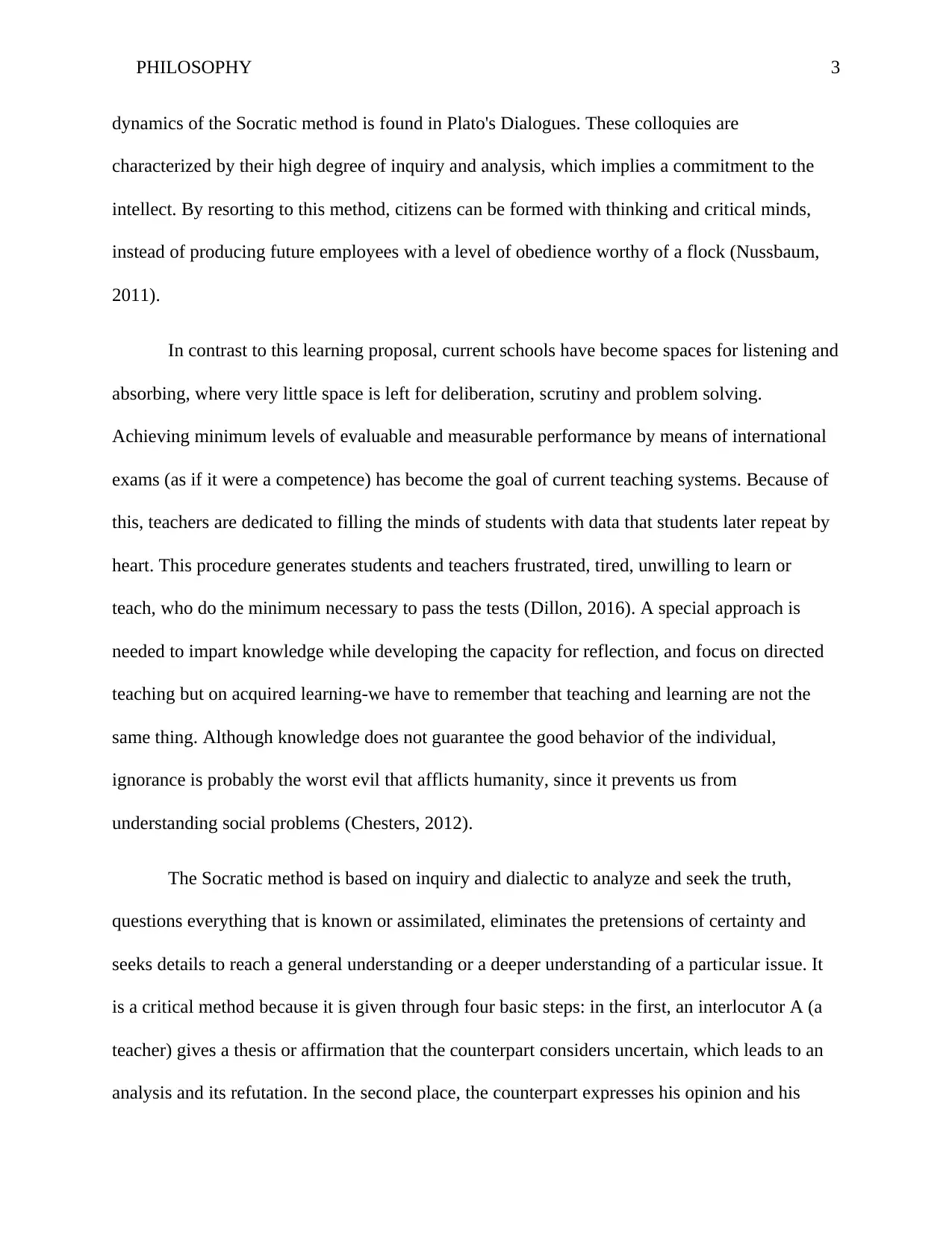
PHILOSOPHY 3
dynamics of the Socratic method is found in Plato's Dialogues. These colloquies are
characterized by their high degree of inquiry and analysis, which implies a commitment to the
intellect. By resorting to this method, citizens can be formed with thinking and critical minds,
instead of producing future employees with a level of obedience worthy of a flock (Nussbaum,
2011).
In contrast to this learning proposal, current schools have become spaces for listening and
absorbing, where very little space is left for deliberation, scrutiny and problem solving.
Achieving minimum levels of evaluable and measurable performance by means of international
exams (as if it were a competence) has become the goal of current teaching systems. Because of
this, teachers are dedicated to filling the minds of students with data that students later repeat by
heart. This procedure generates students and teachers frustrated, tired, unwilling to learn or
teach, who do the minimum necessary to pass the tests (Dillon, 2016). A special approach is
needed to impart knowledge while developing the capacity for reflection, and focus on directed
teaching but on acquired learning-we have to remember that teaching and learning are not the
same thing. Although knowledge does not guarantee the good behavior of the individual,
ignorance is probably the worst evil that afflicts humanity, since it prevents us from
understanding social problems (Chesters, 2012).
The Socratic method is based on inquiry and dialectic to analyze and seek the truth,
questions everything that is known or assimilated, eliminates the pretensions of certainty and
seeks details to reach a general understanding or a deeper understanding of a particular issue. It
is a critical method because it is given through four basic steps: in the first, an interlocutor A (a
teacher) gives a thesis or affirmation that the counterpart considers uncertain, which leads to an
analysis and its refutation. In the second place, the counterpart expresses his opinion and his
dynamics of the Socratic method is found in Plato's Dialogues. These colloquies are
characterized by their high degree of inquiry and analysis, which implies a commitment to the
intellect. By resorting to this method, citizens can be formed with thinking and critical minds,
instead of producing future employees with a level of obedience worthy of a flock (Nussbaum,
2011).
In contrast to this learning proposal, current schools have become spaces for listening and
absorbing, where very little space is left for deliberation, scrutiny and problem solving.
Achieving minimum levels of evaluable and measurable performance by means of international
exams (as if it were a competence) has become the goal of current teaching systems. Because of
this, teachers are dedicated to filling the minds of students with data that students later repeat by
heart. This procedure generates students and teachers frustrated, tired, unwilling to learn or
teach, who do the minimum necessary to pass the tests (Dillon, 2016). A special approach is
needed to impart knowledge while developing the capacity for reflection, and focus on directed
teaching but on acquired learning-we have to remember that teaching and learning are not the
same thing. Although knowledge does not guarantee the good behavior of the individual,
ignorance is probably the worst evil that afflicts humanity, since it prevents us from
understanding social problems (Chesters, 2012).
The Socratic method is based on inquiry and dialectic to analyze and seek the truth,
questions everything that is known or assimilated, eliminates the pretensions of certainty and
seeks details to reach a general understanding or a deeper understanding of a particular issue. It
is a critical method because it is given through four basic steps: in the first, an interlocutor A (a
teacher) gives a thesis or affirmation that the counterpart considers uncertain, which leads to an
analysis and its refutation. In the second place, the counterpart expresses his opinion and his
⊘ This is a preview!⊘
Do you want full access?
Subscribe today to unlock all pages.

Trusted by 1+ million students worldwide
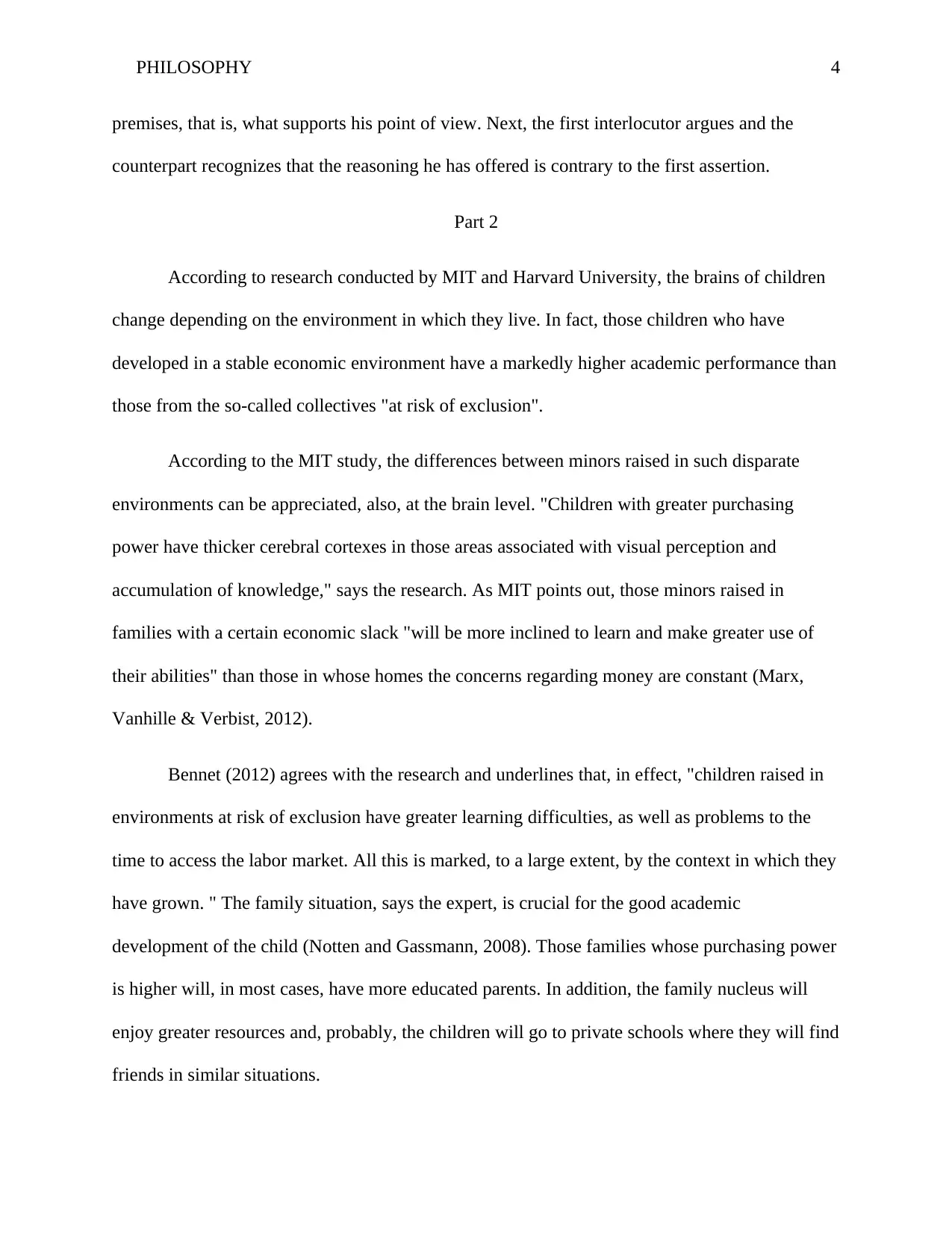
PHILOSOPHY 4
premises, that is, what supports his point of view. Next, the first interlocutor argues and the
counterpart recognizes that the reasoning he has offered is contrary to the first assertion.
Part 2
According to research conducted by MIT and Harvard University, the brains of children
change depending on the environment in which they live. In fact, those children who have
developed in a stable economic environment have a markedly higher academic performance than
those from the so-called collectives "at risk of exclusion".
According to the MIT study, the differences between minors raised in such disparate
environments can be appreciated, also, at the brain level. "Children with greater purchasing
power have thicker cerebral cortexes in those areas associated with visual perception and
accumulation of knowledge," says the research. As MIT points out, those minors raised in
families with a certain economic slack "will be more inclined to learn and make greater use of
their abilities" than those in whose homes the concerns regarding money are constant (Marx,
Vanhille & Verbist, 2012).
Bennet (2012) agrees with the research and underlines that, in effect, "children raised in
environments at risk of exclusion have greater learning difficulties, as well as problems to the
time to access the labor market. All this is marked, to a large extent, by the context in which they
have grown. " The family situation, says the expert, is crucial for the good academic
development of the child (Notten and Gassmann, 2008). Those families whose purchasing power
is higher will, in most cases, have more educated parents. In addition, the family nucleus will
enjoy greater resources and, probably, the children will go to private schools where they will find
friends in similar situations.
premises, that is, what supports his point of view. Next, the first interlocutor argues and the
counterpart recognizes that the reasoning he has offered is contrary to the first assertion.
Part 2
According to research conducted by MIT and Harvard University, the brains of children
change depending on the environment in which they live. In fact, those children who have
developed in a stable economic environment have a markedly higher academic performance than
those from the so-called collectives "at risk of exclusion".
According to the MIT study, the differences between minors raised in such disparate
environments can be appreciated, also, at the brain level. "Children with greater purchasing
power have thicker cerebral cortexes in those areas associated with visual perception and
accumulation of knowledge," says the research. As MIT points out, those minors raised in
families with a certain economic slack "will be more inclined to learn and make greater use of
their abilities" than those in whose homes the concerns regarding money are constant (Marx,
Vanhille & Verbist, 2012).
Bennet (2012) agrees with the research and underlines that, in effect, "children raised in
environments at risk of exclusion have greater learning difficulties, as well as problems to the
time to access the labor market. All this is marked, to a large extent, by the context in which they
have grown. " The family situation, says the expert, is crucial for the good academic
development of the child (Notten and Gassmann, 2008). Those families whose purchasing power
is higher will, in most cases, have more educated parents. In addition, the family nucleus will
enjoy greater resources and, probably, the children will go to private schools where they will find
friends in similar situations.
Paraphrase This Document
Need a fresh take? Get an instant paraphrase of this document with our AI Paraphraser
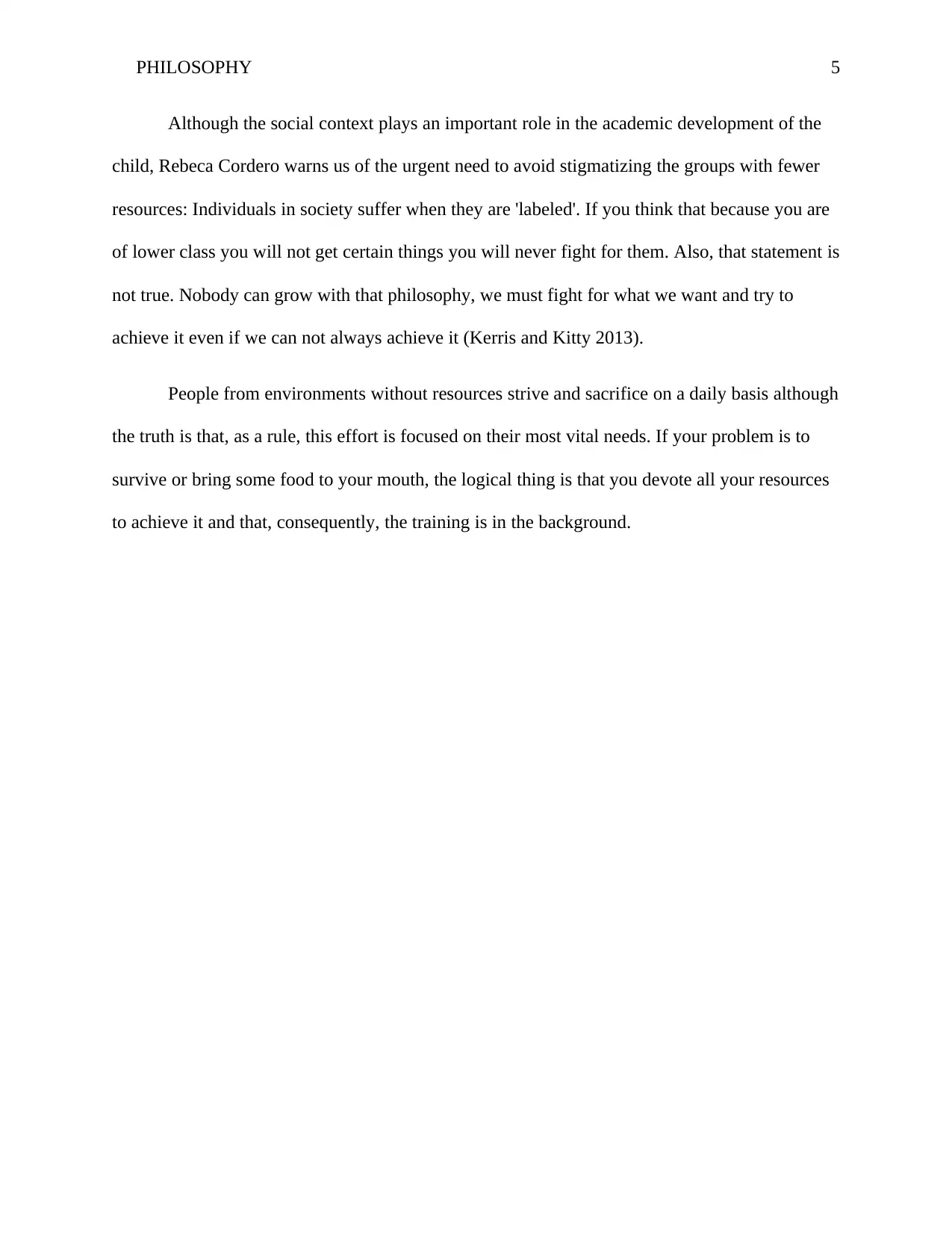
PHILOSOPHY 5
Although the social context plays an important role in the academic development of the
child, Rebeca Cordero warns us of the urgent need to avoid stigmatizing the groups with fewer
resources: Individuals in society suffer when they are 'labeled'. If you think that because you are
of lower class you will not get certain things you will never fight for them. Also, that statement is
not true. Nobody can grow with that philosophy, we must fight for what we want and try to
achieve it even if we can not always achieve it (Kerris and Kitty 2013).
People from environments without resources strive and sacrifice on a daily basis although
the truth is that, as a rule, this effort is focused on their most vital needs. If your problem is to
survive or bring some food to your mouth, the logical thing is that you devote all your resources
to achieve it and that, consequently, the training is in the background.
Although the social context plays an important role in the academic development of the
child, Rebeca Cordero warns us of the urgent need to avoid stigmatizing the groups with fewer
resources: Individuals in society suffer when they are 'labeled'. If you think that because you are
of lower class you will not get certain things you will never fight for them. Also, that statement is
not true. Nobody can grow with that philosophy, we must fight for what we want and try to
achieve it even if we can not always achieve it (Kerris and Kitty 2013).
People from environments without resources strive and sacrifice on a daily basis although
the truth is that, as a rule, this effort is focused on their most vital needs. If your problem is to
survive or bring some food to your mouth, the logical thing is that you devote all your resources
to achieve it and that, consequently, the training is in the background.
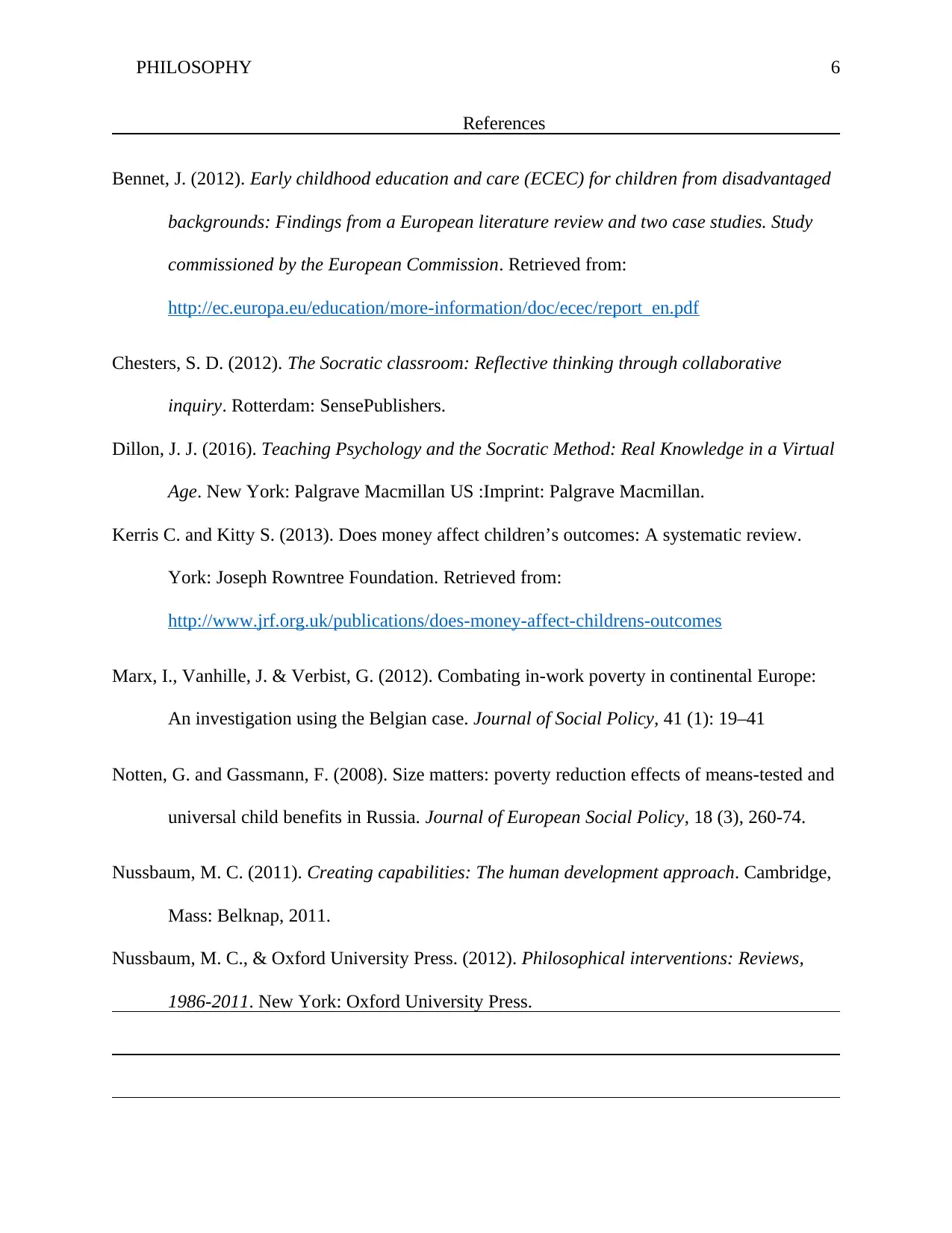
PHILOSOPHY 6
References
Bennet, J. (2012). Early childhood education and care (ECEC) for children from disadvantaged
backgrounds: Findings from a European literature review and two case studies. Study
commissioned by the European Commission. Retrieved from:
http://ec.europa.eu/education/more-information/doc/ecec/report_en.pdf
Chesters, S. D. (2012). The Socratic classroom: Reflective thinking through collaborative
inquiry. Rotterdam: SensePublishers.
Dillon, J. J. (2016). Teaching Psychology and the Socratic Method: Real Knowledge in a Virtual
Age. New York: Palgrave Macmillan US :Imprint: Palgrave Macmillan.
Kerris C. and Kitty S. (2013). Does money affect children’s outcomes: A systematic review.
York: Joseph Rowntree Foundation. Retrieved from:
http://www.jrf.org.uk/publications/does-money-affect-childrens-outcomes
Marx, I., Vanhille, J. & Verbist, G. (2012). Combating in-work poverty in continental Europe:
An investigation using the Belgian case. Journal of Social Policy, 41 (1): 19–41
Notten, G. and Gassmann, F. (2008). Size matters: poverty reduction effects of means-tested and
universal child benefits in Russia. Journal of European Social Policy, 18 (3), 260-74.
Nussbaum, M. C. (2011). Creating capabilities: The human development approach. Cambridge,
Mass: Belknap, 2011.
Nussbaum, M. C., & Oxford University Press. (2012). Philosophical interventions: Reviews,
1986-2011. New York: Oxford University Press.
References
Bennet, J. (2012). Early childhood education and care (ECEC) for children from disadvantaged
backgrounds: Findings from a European literature review and two case studies. Study
commissioned by the European Commission. Retrieved from:
http://ec.europa.eu/education/more-information/doc/ecec/report_en.pdf
Chesters, S. D. (2012). The Socratic classroom: Reflective thinking through collaborative
inquiry. Rotterdam: SensePublishers.
Dillon, J. J. (2016). Teaching Psychology and the Socratic Method: Real Knowledge in a Virtual
Age. New York: Palgrave Macmillan US :Imprint: Palgrave Macmillan.
Kerris C. and Kitty S. (2013). Does money affect children’s outcomes: A systematic review.
York: Joseph Rowntree Foundation. Retrieved from:
http://www.jrf.org.uk/publications/does-money-affect-childrens-outcomes
Marx, I., Vanhille, J. & Verbist, G. (2012). Combating in-work poverty in continental Europe:
An investigation using the Belgian case. Journal of Social Policy, 41 (1): 19–41
Notten, G. and Gassmann, F. (2008). Size matters: poverty reduction effects of means-tested and
universal child benefits in Russia. Journal of European Social Policy, 18 (3), 260-74.
Nussbaum, M. C. (2011). Creating capabilities: The human development approach. Cambridge,
Mass: Belknap, 2011.
Nussbaum, M. C., & Oxford University Press. (2012). Philosophical interventions: Reviews,
1986-2011. New York: Oxford University Press.
⊘ This is a preview!⊘
Do you want full access?
Subscribe today to unlock all pages.

Trusted by 1+ million students worldwide
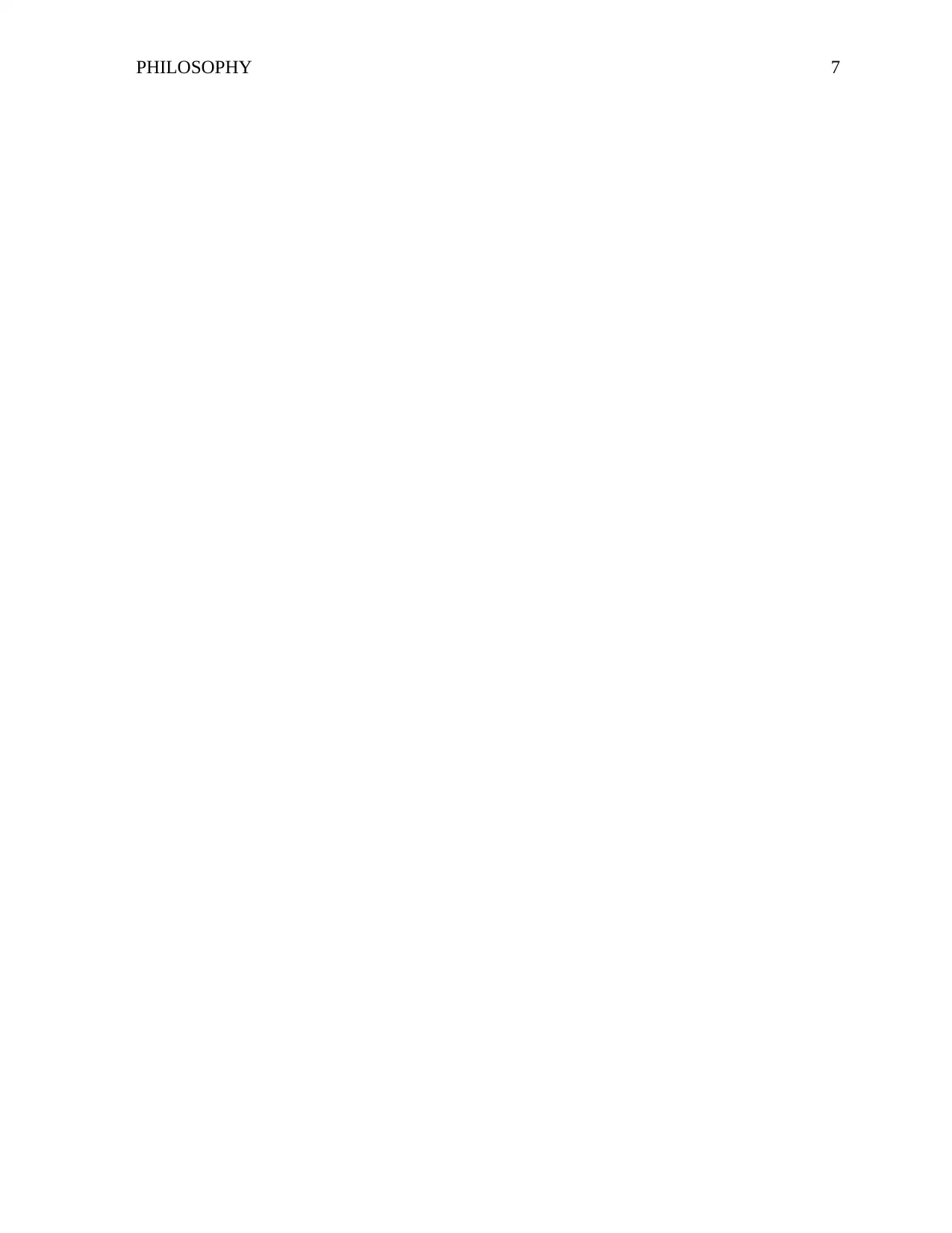
PHILOSOPHY 7
1 out of 7
Related Documents
Your All-in-One AI-Powered Toolkit for Academic Success.
+13062052269
info@desklib.com
Available 24*7 on WhatsApp / Email
![[object Object]](/_next/static/media/star-bottom.7253800d.svg)
Unlock your academic potential
Copyright © 2020–2026 A2Z Services. All Rights Reserved. Developed and managed by ZUCOL.




